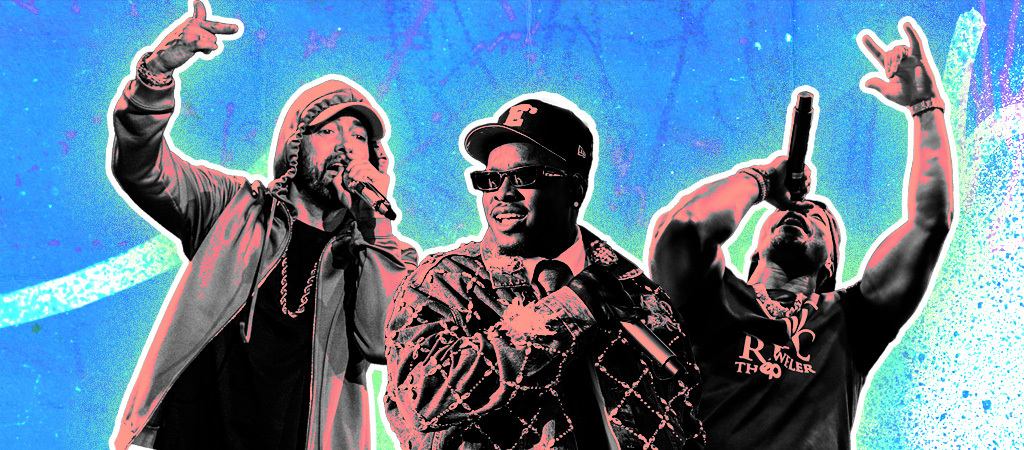Getty Image/Merle Cooper
Although hip-hop as a genre is no stranger to the concept album as a format, there would be little resistance to the assessment that there’s been a bit of a drought of such projects over the past few years. As the industry seeks to game algorithms, chase trends, and otherwise appeal to contracting attention spans and expanding options for occupying that attention, there have been fewer rap albums looking to pushing the envelope, tell a story, or explore a specific theme.
New releases from Blxst, Eminem, Lupe Fiasco, and more may have broken that trend, bringing the rap concept album back in a big way in 2024.
First, let’s define a concept album, to determine just what criteria these projects have met and why there have been so few concept albums in hip-hop over the past few years. While there’s no objective consensus or definition, critics generally accept that a concept album “is an album whose tracks hold a larger purpose or meaning collectively than they do individually,” which is usually accomplished through a narrative tying the songs together. For our purposes here, let’s think of something like Kendrick Lamar’s debut album Good Kid, MAAD City, which tells the story of a day in its protagonist’s life in the city of Compton.
A more recent, albeit overlooked, example would be Skyzoo’s The Mind Of A Saint, which recounts the events of the gangster television series Snowfall from the perspective of its lead character, Franklin Saint. A concept album doesn’t always need to tell a complete story, but in general, this is one of the easiest ways to recognize one and a common trait of the albums we’re comparing here. Relatedly, Skyzoo’s last project also exemplifies why it feels like there’s been such a dearth of such projects recently. Indie and underground rappers like Sky (and peers such as Ka, Open Mike Eagle, and Armand Hammer) have generally been the main ones pushing this format, so concept albums usually go overlooked and underrepresented in the mainstream.
Even Googling something like “rap concept albums 2020s” only generates a list 13 albums long… in a four-year span that’s seen hundreds of new albums released (yes, Google kinda sucks now, but it’s saying something that there are so few albums that could easily be recognized as concept albums since the pandemic). Among the modern crop of rappers, there was at one point a wealth of artists crafting projects around the exploration of a singular theme or narrative — Kendrick Lamar, Mac Miller, and Shabazz Palaces, were all artists who released concept albums I’ve covered here at Uproxx, but lately, there have been fewer and fewer of such projects in favor of 20-plus-track single-paloozas that make great party records or cruising records or “cleaning the house” records.
Which brings us to 2024 and the sudden explosion of albums organized around central narratives, such as Blxst’s debut, I’ll Always Come Find You, Eminem’s The Death Of Slim Shady, and Lupe Fiasco’s Samurai, all released within the last month. With I’ll Always Come Find You, Blxst explores themes of legacy, loyalty, and self-sufficiency through the story of Birdie, a young man who inherits a chauffeur car service when his father dies suddenly, and through the experience finds the life lessons that his patriarch imparted to him reinforced as he encounters fake friends, fair weather flings, and tough choices as he comes of age and accepts his responsibilities. The story is told both through skits that literally depict Birdie’s conversations with various characters, and through the topics of songs like “Too Many Friday Nights,” “Bad Idea,” and “Better Off Friends.”
Likewise, The Death Of Slim Shady relates exactly the tale suggested by its title, as Eminem describes how he came to create the mischievous identity that drove his early success — and how getting lost in it nearly cost him everything. Over the course of the album (so much so that he told fans how important it is to listen in order), Eminem examines the effects his alter ego has had on his life, wrestling with Slim directly on “Guilty Conscience 2,” and reflecting on darker potential outcomes on album closer “Somebody Save Me.” Of course, some fans have determined that the album works just as well in reverse order, ending with the demise of Eminem himself as Shady triumphs, while others perceive a cyclical nature to the battle between the two, with the album’s outro leading into its intro on repeat listens.
Then there’s Lupe Fiasco’s Samurai, which might have the most bugged-out theme of all. Described by Lupe as a tribute to Amy Winehouse, the album expands on a vignette from the documentary chronicling the late soul singer’s life. In a phone call with producer Salaam Remi, Winehouse shares an ambition for battle rap, metaphorically comparing the skill to the martial arts practiced by samurai warriors. Lupe turns the metaphor literal (metaphorically speaking), imagining an alternate history for Winehouse as exactly that: A battle-rapping samurai who manages to face down her demons rather than being consumed by them.
What makes this mini-explosion of concept albums notable is not just their proximity to one another, all dropping in the span of a few weeks, but that they are also coming from some of the biggest names in rap. Blxst is an exciting newcomer with plenty of appeal for younger audiences, while Lupe Fiasco is a respected veteran still closely tied to contemporaries like Drake, J. Cole, and Kendrick Lamar. Eminem, of course, is the biggest name in rap (especially for certain audiences) and his album has topped the Billboard 200 in a year in which the biggest hit so far is an aggressive battle rap aimed at the most prolific hitmaker of the past decade. And all that’s before you add in under-the-radar contributions like Heems’ Lafandar, Kyle’s Smyle Again, and Vince Staples’ Dark Times.
That these albums are seeing such heights of success opens the way for more rappers to get deep on future projects, expanding the boundaries of what hip-hop can and should be. While there’s plenty of room for party music and battle rap, there should always be a space for hip-hop’s high-art aspirations, too. And in 2024, that space has not only grown, it’s proving to be very fertile.



